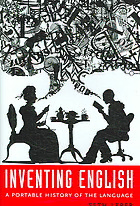
Inventing English : a portable history of the language PDF
Preview Inventing English : a portable history of the language
Inventing English inventing english A Portable History of the Language Seth Lerer columbia university press : new york Columbia University Press : Publishers Since 1893 : New York Chichester, West Sussex Copyright © 2007 Columbia University Press All rights reserved Library of Congress Cataloging-in-Publication Data Lerer, Seth, 1955– Inventing English : a portable history of the language / Seth Lerer. p. cm. Includes bibliographical references and index. ISBN-10 0–231–13794–X (cloth : alk. paper) ISBN-13 978–0–231–13794–2 (cloth : alk. paper) — ISBN-10 0–231–51076–4 (e-book) ISBN-13 978–0-231–51076–9 (e-book) 1. English language—History. 2. English language—Etymology. 3. English language—Old English, ca. 450–1100. 4. English language—Middle English, 1100–1500. 5. Linguistics. I. Title. PE1075.L47 2007 420.9—dc22 2006030652 Columbia University Press books are printed on permanent and durable acid-free paper. This book is printed on paper with recycled content. Printed in the United States of America c 10 9 8 7 6 5 4 3 2 1 contents A Note on Texts and Letter Forms vii INTRODUCTION: Finding English, Finding Us 1 1. Caedmon Learns to Sing Old English and the Origins of Poetry 12 2. From Beowulf to Wulfstan The Language of Old English Literature 25 3. In This Year The Politics of Language and the End of Old English 39 4. From Kingdom to Realm Middle English in a French World 54 5. Lord of This Langage Chaucer’s English 70 6. I Is as Ille a Millere as Are Ye Middle English Dialects 85 7. The Great Vowel Shift and the Changing Character of English 101 8. Chancery, Caxton, and the Making of English Prose 115 9. I Do, I Will Shakespeare’s English 129 10. A Universal Hubbub Wild New Words and Worlds in Early Modern English 141 11. Visible Speech The Orthoepists and the Origins of Standard English 153 12. A Harmless Drudge Samuel Johnson and the Making of the Dictionary 167 13. Horrid, Hooting Stanzas Lexicography and Literature in American English 181 14. Antses in the Sugar Dialect and Regionalism in American English 192 15. Hello, Dude Mark Twain and the Making of the American Idiom 207 16. Ready for the Funk African American English and Its Impact 220 17. Pioneers Through an Untrodden Forest The Oxford English Dictionary and Its Readers 235 18. Listening to Private Ryan War and Language 246 19. He Speaks in Your Voice Everybody’s English 258 Appendix: English Sounds and Their Representation 267 Glossary 271 References and Further Reading 277 Acknowledgments 289 Index 291 vi Contents a note on texts and letter forms All texts from different periods of English appear here in original spellings. Texts from Old and Middle English use some letters not found elsewhere. These are Þ, þ “thorn,” indicating a -th- sound Ð, ð “edth,” indicating a -th- sound æ, Æ “ aesch,” indicating the vowel sound as in Modern American English, “cat” “ yogh,” indicating a sound like a “y” at the begin- nings of words, and a sound like a “gh” in the middle of words 7 the abbreviation for “and” In addition to these letters, I will occasionally represent sounds by using the International Phonetic Alphabet. Each vowel and consonant sound in a language has a special symbol in this alphabet. The appendix to this book lists these symbols, the sounds they represent, and the ways in which speech sounds are described by linguists. Words that are discussed as words, or words from other languages, appear in italics. Words that explain, translate, or define other words appear in “quotations.” Words that are transcribed into the International Phonetic Alphabet to record their pronunciation appear between /slæʃ marks/. At the end of this book are chapter-by-chapter lists of references and suggestions for further reading. In addition to the specific sources and editions I use, there are often many different editions available—in books and on line. Throughout this book, I use the following abbreviations: vii CHEL The Cambridge History of the English Language, general editor Richard M. Hogg, 6 vols. (Cambridge: Cambridge University Press, 1992–2002). OED The Oxford English Dictionary, originally edited by James A. H. Murray (Oxford: Oxford University Press, 1889–1928); Supple- ment, 1933; second edition, 1989. Online at http://dictionary. oed.com. Finally, unless otherwise noted, all translations from Old English, Mid- dle English, and early Modern English, and from other languages, are my own. viii ANote onTextandLetterForms Inventing English
